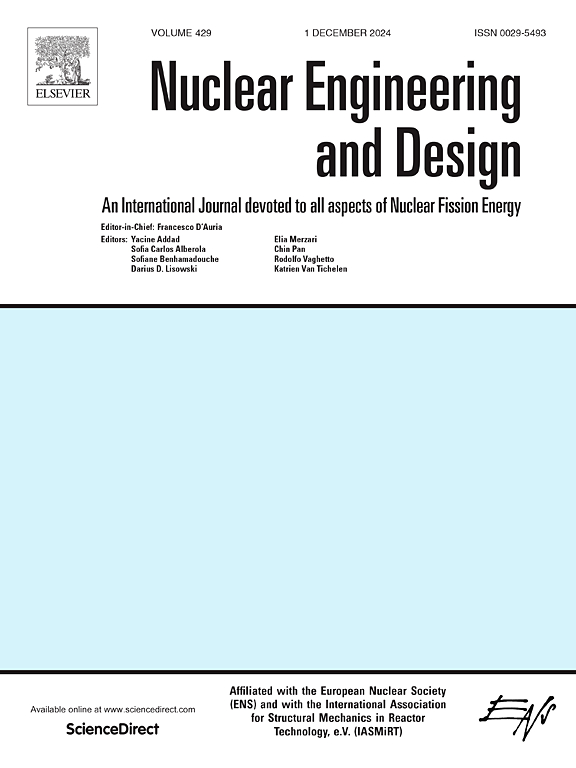Research on severe accident diagnosis method based on PCA and DT for a small modular PWR
IF 1.9
3区 工程技术
Q1 NUCLEAR SCIENCE & TECHNOLOGY
引用次数: 0
Abstract
Small modular pressurized water reactor (SMPWR) is a new trend in the development of nuclear energy today. SMPWRs usually adopt the integrated arrangement and use many passive safety systems, which have high inherent safety. However, despite all precautions, the severe accident (SA) cannot be completely avoided. It is necessary to conduct rapid and timely diagnosis for these SAs. Different from the traditional SA diagnosis methods based on signals and knowledge, the data-based method is adopted to study SA diagnosis of SMPWR in this study. First, the SA state monitoring method based on principal component analysis (PCA) is proposed to realize rapid and accurate distinction between steady-state and abnormal conditions. Then, the SA classification diagnosis method based on decision tree (DT) is proposed to realize accurate diagnosis of initial events and whether the entry conditions of SA management guideline (SAMG) are met. The key parameters selected through feature selection can provide supplement and reference for the selection of monitoring parameters in SAMG and the determination of the instrument list for instrument availability analysis under SA conditions. The fault diagnosis method proposed in this paper can provide the reference and basis for the SA diagnosis and the design of the operator’s SA handling auxiliary system in the SMPWR.
基于PCA和DT的小型模块化压水堆严重事故诊断方法研究
小型模块化压水堆(SMPWR)是当今核能发展的新趋势。SMPWRs通常采用整体式布置,采用多套被动安全系统,具有较高的固有安全性。然而,尽管采取了各种预防措施,严重事故(SA)仍不能完全避免。对这些sa进行快速、及时的诊断是必要的。与传统的基于信号和知识的SA诊断方法不同,本研究采用基于数据的方法来研究SMPWR的SA诊断。首先,提出了基于主成分分析(PCA)的SA状态监测方法,实现了稳态与异常状态的快速准确区分;然后,提出了基于决策树(DT)的SA分类诊断方法,以实现对初始事件和SA管理指南(SAMG)是否满足进入条件的准确诊断。通过特征选择选择的关键参数,可以为SAMG监测参数的选择和SA条件下仪器可用性分析仪器清单的确定提供补充和参考。本文提出的故障诊断方法可为小压水堆事故诊断及操作人员事故处理辅助系统的设计提供参考和依据。
本文章由计算机程序翻译,如有差异,请以英文原文为准。
求助全文
约1分钟内获得全文
求助全文
来源期刊

Nuclear Engineering and Design
工程技术-核科学技术
CiteScore
3.40
自引率
11.80%
发文量
377
审稿时长
5 months
期刊介绍:
Nuclear Engineering and Design covers the wide range of disciplines involved in the engineering, design, safety and construction of nuclear fission reactors. The Editors welcome papers both on applied and innovative aspects and developments in nuclear science and technology.
Fundamentals of Reactor Design include:
• Thermal-Hydraulics and Core Physics
• Safety Analysis, Risk Assessment (PSA)
• Structural and Mechanical Engineering
• Materials Science
• Fuel Behavior and Design
• Structural Plant Design
• Engineering of Reactor Components
• Experiments
Aspects beyond fundamentals of Reactor Design covered:
• Accident Mitigation Measures
• Reactor Control Systems
• Licensing Issues
• Safeguard Engineering
• Economy of Plants
• Reprocessing / Waste Disposal
• Applications of Nuclear Energy
• Maintenance
• Decommissioning
Papers on new reactor ideas and developments (Generation IV reactors) such as inherently safe modular HTRs, High Performance LWRs/HWRs and LMFBs/GFR will be considered; Actinide Burners, Accelerator Driven Systems, Energy Amplifiers and other special designs of power and research reactors and their applications are also encouraged.
 求助内容:
求助内容: 应助结果提醒方式:
应助结果提醒方式:


